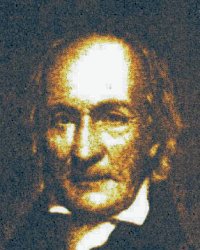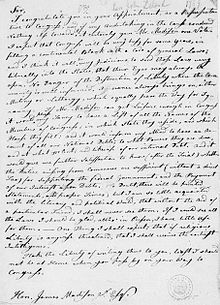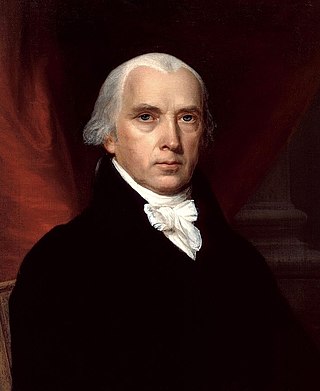
James Madison was an American statesman, diplomat, and Founding Father who served as the fourth president of the United States from 1809 to 1817. Madison was popularly acclaimed the "Father of the Constitution" for his pivotal role in drafting and promoting the Constitution of the United States and the Bill of Rights.
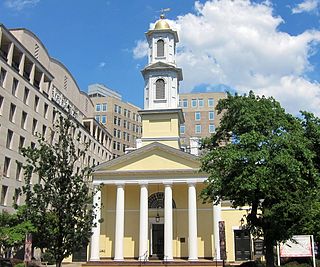
Religious affiliations can affect the electability of the presidents of the United States and shape their stances on policy matters and their visions of society and also how they want to lead it. While no president has ever openly identified as an atheist, Thomas Jefferson, Abraham Lincoln, and William Howard Taft were speculated to be atheists by their opponents during political campaigns; in addition, a survey during the presidency of Donald Trump showed that 63% of Americans did not believe he was religious, despite his professed Christian affiliation. Conversely, other presidents, such as Jimmy Carter, have used their faith as a defining aspect of their campaigns and tenure in office.

Roger Williams was an English-born New England Puritan minister, theologian, and author who founded Providence Plantations, which became the Colony of Rhode Island and Providence Plantations and later the State of Rhode Island. He was a staunch advocate for religious freedom, separation of church and state, and fair dealings with the Native Americans.

Elijah Craig was an American Baptist preacher, who became an educator and capitalist entrepreneur in the area of Virginia that later became the state of Kentucky. He has sometimes, although rather dubiously, been credited with the invention of bourbon whiskey.

The quotation "all men are created equal" is found in the United States Declaration of Independence. The final form of the sentence was stylized by Benjamin Franklin and penned by Thomas Jefferson during the beginning of the Revolutionary War in 1776. It reads:
"We hold these truths to be self-evident, that all men are created equal, that they are endowed by their Creator with certain unalienable Rights, that among these are Life, Liberty and the pursuit of Happiness."

John Clarke was a physician, Baptist minister, co-founder of the Colony of Rhode Island and Providence Plantations, author of its influential charter, and a leading advocate of religious freedom in America.

The Founding Fathers of the United States, commonly referred to simply as the Founding Fathers, were a group of late-18th-century American revolutionary leaders who united the Thirteen Colonies, oversaw the War of Independence from Great Britain, established the United States, and crafted a framework of government for the new nation.
"Separation of church and state" is a metaphor paraphrased from Thomas Jefferson and used by others in discussions regarding the Establishment Clause and Free Exercise Clause of the First Amendment to the United States Constitution which reads: "Congress shall make no law respecting an establishment of religion, or prohibiting the free exercise thereof..."
In United States law, the Establishment Clause of the First Amendment to the United States Constitution, together with that Amendment's Free Exercise Clause, form the constitutional right of freedom of religion. The relevant constitutional text is:
Congress shall make no law respecting an establishment of religion...
Separation of church and state is one of the primary theological distinctions of the Baptist tradition.

Isaac Backus was a leading Baptist minister during the era of the American Revolution who campaigned against state-established churches in New England. Little is known of his childhood. In "An account of the life of Isaac Backus", he provides genealogical information and a chronicle of events leading to his religious conversion.
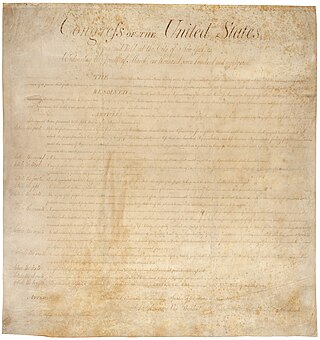
The United States Bill of Rights comprises the first ten amendments to the United States Constitution. Proposed following the often bitter 1787–88 debate over the ratification of the Constitution and written to address the objections raised by Anti-Federalists, the Bill of Rights amendments add to the Constitution specific guarantees of personal freedoms and rights, clear limitations on the government's power in judicial and other proceedings, and explicit declarations that all powers not specifically granted to the federal government by the Constitution are reserved to the states or the people. The concepts codified in these amendments are built upon those in earlier documents, especially the Virginia Declaration of Rights (1776), as well as the Northwest Ordinance (1787), the English Bill of Rights (1689), and Magna Carta (1215).

The Cheshire Mammoth Cheese was a gift from the town of Cheshire, Massachusetts to President Thomas Jefferson in 1802. The 1,235-pound (560 kg) cheese was created by combining the milk from every cow in the town, and made in a makeshift cheese press to handle the cheese's size. The cheese bore the Jeffersonian motto "Rebellion to tyrants is obedience to God."

Samuel Davies was an evangelist and Presbyterian minister. Davies ministered in Hanover County from 1748 to 1759, followed by a term as the fourth President of Princeton University, then known as the College of New Jersey, from 1759 to 1761. Davies was one of the first non-Anglican preachers in Virginia, and one of earliest missionaries to slaves in the Thirteen Colonies. He was a strong advocate for religious freedom, and helped to institute significant religious reforms in the colony. Davies was also a prolific writer, authoring several hymns and publishing a book of poetry.
The religious views of Thomas Jefferson diverged widely from the traditional Christianity of his era. Throughout his life, Jefferson was intensely interested in theology, religious studies, and morality. Jefferson was most comfortable with Deism, rational religion, theistic rationalism, and Unitarianism. He was sympathetic to and in general agreement with the moral precepts of Christianity. He considered the teachings of Jesus as having "the most sublime and benevolent code of morals which has ever been offered to man," yet he held that the pure teachings of Jesus appeared to have been appropriated by some of Jesus' early followers, resulting in a Bible that contained both "diamonds" of wisdom and the "dung" of ancient political agendas.

Cyrus Pitt Grosvenor was an American Baptist minister known for his anti-slavery views. He founded the abolitionist American Baptist Free Mission Society, which did not allow slaveowners to be missionaries, and refused their contributions, prefiguring the split in the Baptist Church in America into Southern and Northern associations. He helped found and served as the first president of New York Central College, the first college in the United States to admit both women and Blacks on an equal basis from its first day, and the first college to employ Black professors. He was described as "a reforming steam engine". In his retirement he worked on a famous mathematics problem and took out a patent to prevent lamp explosions.

Aaron Leland was a Vermont minister and politician who served as the seventh lieutenant governor of Vermont.

The history of religion in early Virginia begins with the founding of the Virginia Colony, in particular the commencing of Anglican services at Jamestown in 1607. In 1619, the Church of England was made the established church throughout the Colony of Virginia, becoming a dominant religious, cultural, and political force. Throughout the 18th century its power was increasingly challenged by Protestant dissenters and religious movements. Following the American Revolution and political independence from Britain, in 1786 the Virginia Statute for Religious Freedom disestablished the Church of England, ending public support and fully legalizing the public and private practice of other religious traditions.
This bibliography of James Madison is a list of published works about James Madison, the 4th president of the United States.
The first election for Virginia's 5th congressional district took place on February 2, 1789, for a two-year term to commence on March 4 of that year. In a race that turned on the candidates' positions on the need for amendments to the recently ratified U.S. Constitution, James Madison defeated James Monroe for a place in the House of Representatives of the First Congress. It is the only congressional election in U.S. history in which two future presidents opposed each other.
